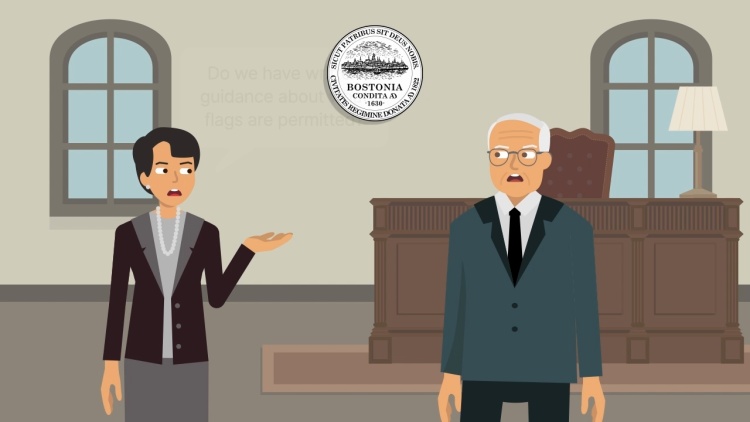Shurtleff v. City of Boston, Massachusetts
United States Supreme Court
596 U.S 243, 142 S. Ct. 1583 (2022)
- Written by Salina Kennedy, JD
Facts
The City of Boston, Massachusetts (city) (defendant) erected three flagpoles on the plaza outside Boston City Hall. The city flew the American flag from the first pole and the Massachusetts flag from the second pole. Ordinarily, the city flew its own flag from the third pole. However, on approximately 20 days per year, the city allowed private groups to hold ceremonies on the plaza. The group hosting one of these ceremonies was permitted to fly any flag it chose on the third flagpole. To get permission to hold a ceremony, a group was required to fill out an application that asked for contact information and a brief description of the proposed event, along with the proposed date and time. The application did not ask for a description of the flag, and the city employee who reviewed applications never saw the flags before the ceremonies. Additionally, the city had no written policy for granting or denying requests based on a flag’s content. For years, the city approved all flag-raising requests. This changed in 2017, when Harold Shurtleff (plaintiff) submitted a request. Shurtleff was the director of Camp Constitution, a Christian group that wanted to hold a ceremony and raise the Christian flag. The city allowed the group to hold the ceremony but denied Shurtleff’s request to raise the flag. Shurtleff filed a federal lawsuit alleging that the city’s refusal of his flag request violated the First Amendment Free Speech Clause. The district court held that flying flags chosen by private groups constituted government speech and that therefore the city’s refusal of Shurtleff’s request did not violate the Constitution. The United States Court of Appeals for the First Circuit affirmed, and the United States Supreme Court granted certiorari.
Rule of Law
Issue
Holding and Reasoning (Breyer, J.)
Concurrence (Alito, J.)
What to do next…
Here's why 910,000 law students have relied on our case briefs:
- Written by law professors and practitioners, not other law students. 47,100 briefs, keyed to 997 casebooks. Top-notch customer support.
- The right amount of information, includes the facts, issues, rule of law, holding and reasoning, and any concurrences and dissents.
- Access in your classes, works on your mobile and tablet. Massive library of related video lessons and high quality multiple-choice questions.
- Easy to use, uniform format for every case brief. Written in plain English, not in legalese. Our briefs summarize and simplify; they don’t just repeat the court’s language.





